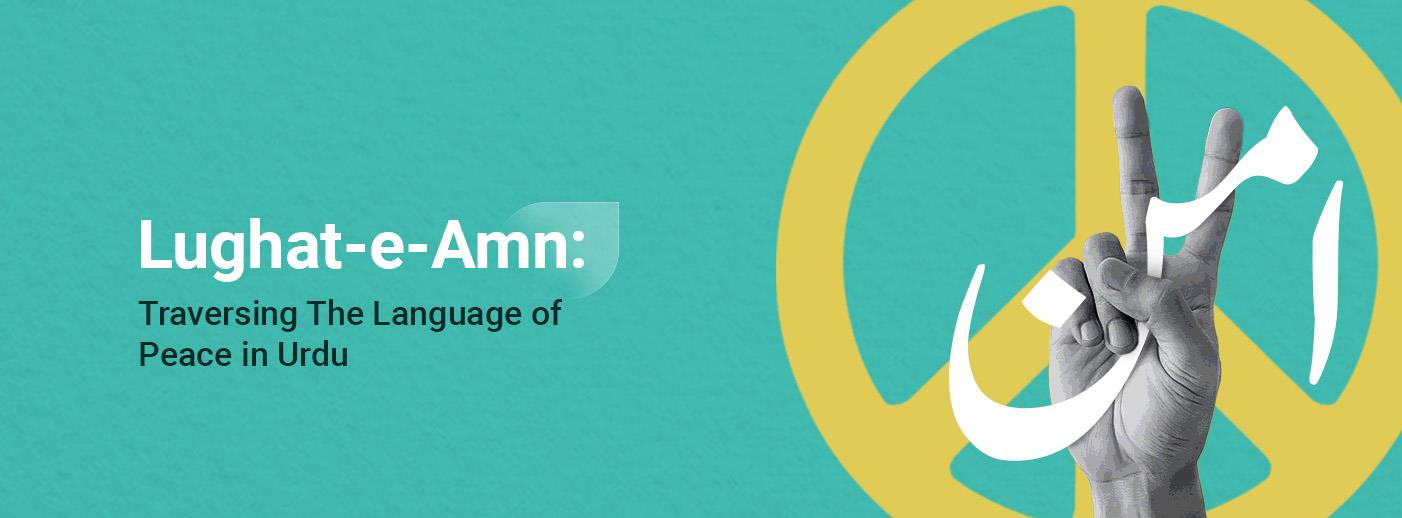अधिक खोजे गए शब्द
सहेजे गए शब्द
खिस्यानी बिल्ली खम्बा नोचे
जिसे क्रोध आ रहा हो वह अपनी खीझ या क्रोध दूसरों पर उतारता है, लाचारी में आदमी दूसरों पर क्रोध करता है, लज्जित व्यक्ति दूसरों पर अपनी लज्जा उतारता है, निर्बल की खीझ
कोशिश
कोई काम करने के लिए विशेष रूप से किया जानेवाला प्रयत्न, मेहनत, दौड़ धूप, प्रयत्न, प्रयास, चेष्टा, उद्योग, श्रम, उद्यम, उपाय, परिश्रम
आठ बार नौ त्योहार
सुख-सुविधा और आराम का शौक़ या लगन ऐसा बढ़ा हुआ है कि युग और समय उसको अल्प व्यय नहीं करने देता
चमनिस्तान
ऐसा बाग़ जहाँ फूल ही फूल हों, ऐसी जगह जहाँ दूर तक फूल ही फूल और हरा भरा नज़र आए, वाटिका, चमन, बाग़
दादरा
संगीत में एक प्रकार का चलता गाना (पक्के या शास्त्रीय गानों से भिन्न), एक प्रकार का गान, एक ताल
Lughat-e-Amn: Traversing The Language of Peace in Urdu

We hope you are enjoying your time with the Rekhta Dictionary Urdu blog. Your perpetual pursuit of exploring and mastering advanced Urdu vocabulary is genuinely commendable. Fueled by your unwavering passion for the language, our latest article presents a lexicon dedicated to peace and harmony, encapsulated in a concise yet comprehensive piece. Join us as we delve into the ocean of amn pasand zaban (peace-loving language) and uncover the gems of amn-o-muhabbat (peace and love).
Today's first featured word in our blog is "sulh" صُلْح. This Arabic-origin word incorporates innumerable definitions, including peace, truce, treaty, and reconciliation. "Sulh" صُلْح can be used in various contexts, forms, and elegant compound terms. For instance, when two parties attain a voluntary reconciliation or compromise, it is designated "sulh-e-ikhtiyaarii" صُلْحِ اختیاری. An agreement to halt hostilities temporarily is known as "sulh-e-chand-roza" صُلْحِ چند روزہ (armistice). Contrarily, a breach of the peace is defined as "sulh-shikanii صُلْح شکنی. If negotiations are fruitful and result in a lasting and comprehensive peace, the terms "sulh-e-kamil" صُلْحِ کامل or "sulh-e-kul" صُلْحِ کل are employed.
Delving deeper, we encounter numerous additional terms and expressions related to "sulh" صُلْح A person who epitomizes peacefulness or pursues peace is termed "sulh-juu" صُلْح جو or "sulh-var" صُلْح ور Similarly, an individual who facilitates or mediates peace or reconciliation is termed "sulh-kaar" صُلْح کار or "sulh-kuninda" صُلْح کنندہ (conciliator, peacemaker). You may be curious about the term for a peace treaty in Urdu; this elegant and endearing term is "sulh-naama" صُلْح نامہ.
“Amn" أمن is one of the most cheery and heartfelt Urdu words. It manifests peace, calm, tranquility, safety, and security. Same as"sulh," "amn" can be utilized in various forms, including compound, prefix, suffix, and infix. The most widespread term is "amn-o-amaan" أمن و أمان. When your town goes through the climate of "amn-o-amaan" أمن و أمان, it enjoys sweeping and all-round law and order. This term also delivers a sense of peace and safety, fostering an atmosphere of tranquility. Another term is "amn-chain" أمن چین which, while dispensing the same meaning as "amn-o-amaan" أمن و أمان is more broadly used. It symbolizes general safety and security and sometimes conveys a relaxed and carefree demeanor.
We cherish individuals who are calm, composed, and peace-loving. In Urdu, such a person is referred to as "amn-pasand" أمن پسند. To describe a mental state characterized by relaxation and a love for peace, the phrase "amn-pasandii" أمن پسندی is used. Every society and community requires individuals who actively promote and establish peace, especially among diverse groups. These individuals are known as "amn-ke-payambar" أمن کے پیمبر (messengers of peace). Another remarkable Urdu phrase is "payaam-e-amn" پیام أمن which means the message of peace. A place that is peaceful and safe is called "pur-amn" پر أمن. Additionally, you can enhance your vocabulary with "pur-sukuun", another term for tranquility.
Let's highlight the most invigorating phrase for today’s blog: "pur-amn-baqaa-e-baaham" پر أمن بقائے باہم. This four-word composite encapsulates the essence of a pluralistic and multicultural society, referring to peaceful coexistence.
Concluding this discussion on "pur-amn”, we are delighted to emphasize that Urdu boasts a vast stockpile of such delightful terms and expressions. Articles of this modest length cannot even scratch the surface of these ever-expanding words. However, we firmly believe that these brief blogs serve as powerful motivators and sources of inspiration, igniting an unceasing passion for learning among Urdu enthusiasts
Delete 44 saved words?
क्या आप वास्तव में इन प्रविष्टियों को हटा रहे हैं? इन्हें पुन: पूर्ववत् करना संभव नहीं होगा





